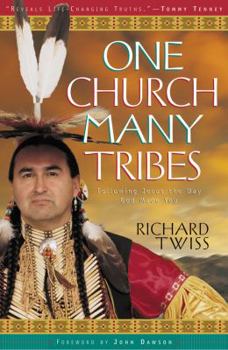One Church Many Tribes
Select Format
Select Condition 
Book Overview
In this captivating chronicle of the Native American story, Richard Twiss of the Rosebud Lakota/Sioux sifts through myth and legend to reveal God's strategy for the nation's host people. This description may be from another edition of this product.
Format:Paperback
Language:English
ISBN:0830725458
ISBN13:9780830725458
Release Date:August 2000
Publisher:Regal Books
Length:219 Pages
Weight:0.57 lbs.
Dimensions:0.7" x 5.5" x 8.5"
Customer Reviews
5 ratings
"500 years of bad haircuts"
Published by Thriftbooks.com User , 16 years ago
When my family moved to Kentucky in 2000, I never expected it would take eighteen months to find a church that wanted us. We didn't fit in anyone's denominational or cultural "box", and very few fellow Christians were interested in stretching their boundaries to include us. Imagine waiting five centuries to be welcomed into the Body of Christ. That's the sobering, challenging message of One Church, Many Tribes. In bringing the message of Jesus to the indigenous peoples of this continent, far too often the expectation has been that a conversion to Christianity includes a conversion to whiteness, and that God has no use for Native American languages, history, arts, etc. This couldn't be more wrong. As Twiss puts it, "When we come to Christ as First Nations people, Jesus does not ask us to abandon our sin-stained culture in order to embrace someone else's sin-stained culture." However, this is not a "make white people feel bad" book. Twiss admits that, had God chosen the peoples of this hemisphere to take the Gospel to Europe, there would have been similar abuses. He wants to see reconciliation: for whites to repent of their superiority, and for Native Americans to repent of their bitterness, so that we can put away these past sins and work together as equals. The Body of Christ is undeniably richer for the presence of African and African-American cultures, despite the bitterness of slavery and the evil aspects of colonialism. It's time to welcome Native Americans to the table (and other "first nations" peoples as well), and encourage them to let God speak through their cultures.
Provides hope for the First Nations Tribes
Published by Thriftbooks.com User , 16 years ago
I thought this book presented Multicultural worship in a whole new light. As a Native American, our traditions are bred out of us as "worshiping the devil" until little to nothing remains. We had to choose between our Culture or our Christian faith. I have given this book to numerous people including my pastor and a college ministry professor who teaches on unity. I hope that this will break down walls that have been up for centuries.
The Jesus Way- not the colonist's way
Published by Thriftbooks.com User , 17 years ago
This is a well written book penned by a man on fire for Christ. Many of the topics covered- or should I say uncovered and brought into the light of day- are common sense Christian ethics and theology. Haircuts, clothing styles, and a particular kind of worship music do not make a person a Christian. Richard Twiss makes apparent the fact that people of all nations can honor Jesus through music, dances, and some of their cultural traditions. He goes into depth to explain he is not advocating syncretism. He is advocating reconciliation through Christ and the elimination of walls between Christian Indigenous people and non-native evangelical churches. The anglos of the old days said no to dancing in order to honor God. I say dance like king David and let the spark of the Holy Spirit within you blaze like a bonfire.
For More Than Just First Nations Believers
Published by Thriftbooks.com User , 21 years ago
This book is half exploration of the Native experience with the Church, and half examination of how a Christian life should manifest itself in particular cultures. Twiss gives a good general introduction to the spectacularly poor manner in which First Nations peoples have been treated as not merely targets of evangelization, but as believers who did not find the alleged brotherhood of the faith either very brotherly or faithful. It is a sad, disgusting tale, made personal by the account of Chief Spokane Garry.It is the rest of the book, however, where the hope shines through. Here, Twiss asks the darn good question: Why shouldn't First Nations persons use their own instruments, music, dress, and dance to honor God? Yes, why not? He expands the argument to include aboriginal peoples all around the world, and it is actually applicable to any culture that wonders why it's being fed the Western way as the alleged way things are to be done. He developes a careful, Biblically sensitive mindset on how to think through these issues, such that one can disassociate cultural items from an original context that may not have been consonant with Biblical values, and give them new life in the Christian worldview. It is a great vision of Christ transforming culture. When this type of thinking catches on around the world, the kingdom will grow in leaps and bounds. For anyone who feels their culture, or subculture, has been stepped on by middle-class Western values that someone has tried to hide in God's mouth, this book will help set you free to drum, create, dance, and dress in ways that both make sense to your people and honor your God.
You might be surprised...
Published by Thriftbooks.com User , 22 years ago
...at how balanced this work is. Twiss does an admirable job of presenting a coherent and sensitive biblical viewpoint on the cultural influences on both Scripture - which he obviously holds in high regard - and our theologizing. This allows the reader to have a greater understanding of how cultural blind spots exist in our theological and religious thinking. At the same time, the author explores both the possibility and desireability of cultural awareness, sensitivity and incorporation into our theology and church's (or messianic synagogue's) life.






